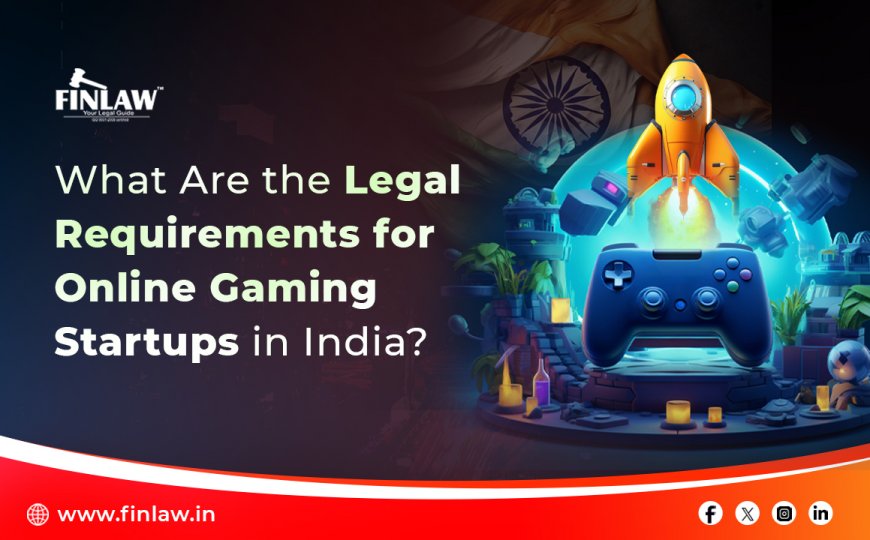Legal Requirements For Online Gaming Startups in India
Explore legal requirements for online gaming startups in India. Learn about licenses, compliance, and industry laws to avoid regulatory pitfalls.

The online gaming industry in India has witnessed remarkable growth in recent years. With a diverse population and increasing internet penetration, the market is ripe for innovation. However, entering this industry requires a solid understanding of the legal landscape to avoid regulatory pitfalls. This article outlines the key legal requirements for online gaming startups in India.
However, entering this industry requires a solid understanding of the legal landscape to avoid regulatory pitfalls. To explore a broader perspective on Online Gaming Laws in India, check out our comprehensive guide.
1. Classification of Online Games: Skill vs. Chance
Indian laws categorize online games based on whether they involve skill or chance:
-
Games of Skill: These are exempt from most gambling regulations. Popular examples include fantasy sports, chess, and rummy.
-
Games of Chance: These are considered gambling and are heavily regulated or prohibited in several states.
Understanding this distinction is crucial as it determines the licensing and operational requirements for your gaming startup.
Learn more about the differences between Skill Based and Chance Based Gaming in India
2. Licensing Requirements For Online Gaming Startups in India
The Indian legal framework requires specific licenses for online gaming operations:
a. State-specific Licenses
Certain states, like Nagaland, Meghalaya, and Sikkim, have established laws governing online gaming. Online gaming startups in India that are offering skill-based games may need to apply for state-specific licenses, such as:
-
Nagaland Prohibition of Gambling and Regulation of Online Games Act: Covers games of skill like poker, rummy, and chess.
-
Sikkim Online Gaming (Regulation) Act: Primarily for games of chance but includes provisions for skill-based games.
b. All-India Operational Licenses
Currently, there is no central regulatory framework for online gaming in India. However, startups targeting a nationwide audience must ensure compliance with multiple state laws.
c. GST Registration
Online gaming startups in India must register under the Goods and Services Tax (GST) Act, as revenue from gaming activities is taxable.
3. Legal Compliance For Online Gaming Startups in India
a. Adherence to IT Laws
Online Gaming Startups in India must comply with the Information Technology (Intermediary Guidelines and Digital Media Ethics Code) Rules, 2021, which mandate the following:
-
Appointment of grievance officers.
-
Transparency in operations.
-
Prohibition of games that harm public morality.
b. Anti-Money Laundering (AML) Compliance
Online gaming platforms dealing with financial transactions must comply with the Prevention of Money Laundering Act (PMLA). This involves:
-
Verifying player identities.
-
Monitoring high-value transactions.
-
Reporting suspicious activities to authorities.
c. Data Protection
While India’s Personal Data Protection Bill is still under consideration, gaming startups should proactively adopt best practices for handling user data, including encryption and secure payment gateways.
Online Gaming Startups in India must comply with the Information Technology Rules, 2021, which are part of India's broader gaming guidelines.
4. Intellectual Property Rights (IPR)
Protecting your gaming platform’s intellectual property is vital to prevent misuse or replication. Ensure you:
-
Trademark your brand name and logo.
-
Secure copyrights for game designs, code, and visuals.
-
Patent unique gaming mechanisms, if applicable.
5. Advertising Standards and Content Regulations
Promoting your online gaming startup in India requires adherence to advertising standards. Avoid misleading claims, especially for games involving financial rewards.
The Advertising Standards Council of India (ASCI) has issued guidelines for gaming ads, emphasizing responsible messaging.
6. Prohibited Activities and Restrictions
Indian laws strictly prohibit:
-
Promoting gambling in states where it is banned.
-
Offering games that resemble betting or wagering without appropriate licenses.
-
Targeting vulnerable groups, such as minors, with gaming ads.
7. Emerging Trends and Future Legal Developments
The legal landscape for online gaming in India is evolving. Online gaming startups in India should monitor:
-
Central Regulatory Framework: The government is considering uniform laws to regulate online gaming nationwide.
-
Taxation Changes: GST rates for online gaming may increase, affecting pricing models.
Keeping abreast of these developments is essential for long-term compliance and success.
Understanding these legal requirements is the first step toward building a compliant and successful online gaming business. For an in-depth look at the legal framework, visit our guide on Simplifying Online Gaming Laws in India.
What's Your Reaction?



















